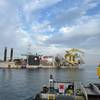Shipowners Call for Sustainable Regulation
The global trade association for the shipping industry, the International Chamber of Shipping (ICS), has called for all future proposals for environmental regulation that impact on ships to be subjected to a full and proper cost benefit analysis before adoption by the International Maritime Organization (IMO).
ICS is using the occasion of IMO World Maritime Day to explain its views on sustainable shipping, and has produced a special brochure for maritime policy makers – see www.ics-shipping.org/sustainable-shipping.pdf
ICS has set out how the shipping industry supports the goals for sustainable development agreed by world leaders at last year’s United Nations Summit on Sustainable Development.
ICS Secretary General, Peter Hinchliffe explained, “International shipping directly facilitates the growth of world trade, economic development, and the improvement of global living standards - including amongst the billion or more people that do not yet have access to electricity.”
ICS argues that when it comes to environmental sustainability, shipping is the only major industry to already have a binding global deal in place – agreed by IMO – to reduce its CO2 emissions. When it comes to social sustainability and decent working conditions for seafarers, shipping is the only industry to have a mandatory global framework in place which is as comprehensive as the new ILO Maritime Labour Convention.
But the economic sustainability of shipping is vital too. ICS suggests that maritime policy makers should give equal priority to each of the three pillars of sustainable development including the economic, as well as the environmental and social.
“Unless the industry is commercially viable it will not be able to deliver the investments in environmental and social improvements that are sought by regulators on behalf of society at large,” Mr Hinchliffe said.
The ICS Secretary General, who is chairing a session at the IMO Symposium being held on World Maritime Day to discuss sustainable development goals for the maritime sector, added: “The vital need to protect the environment and for ships to comply fully with all new environmental regulations is fully recognised by ICS. In order to maintain a fair and competitive industry, it is vital that all new IMO rules are properly enforced on a global basis. It is hoped, nevertheless, that one of the outcomes of IMO’s new focus on sustainable development is that all proposals for any future IMO environmental regulation will be shown to meet existing IMO criteria for compelling need and be subjected to a full and proper cost benefit analysis, in a similar manner to proposals relating to the improvement of maritime safety.”
ICS members believe that the conduct by IMO of full and proper cost benefit analysis of all new regulatory proposals will help to ensure the delivery of sustainable development, consistent with the goals agreed by the United Nations.
While shipping’s regulators have a responsibility to protect the environment and the interests of wider society, they also need to be practical and have an understanding of the impact that their actions can have on the industry’s own long term sustainability, especially if the ‘compelling need’ for potentially very expensive proposals has not been properly demonstrated.
The ICS brochure, which is being presented to governments at the IMO Symposium on World Maritime Day, makes the case that the sustainable development of society at large requires an international shipping industry that is sustainable too.
This is especially important in view of shipping’s role in the continuing spread of global prosperity and the movement of about 90% of trade in goods, energy and raw materials, which are a prerequisite for further economic and social development.
The ICS brochure can be downloaded free of charge from the ICS website.
ics-shipping.org














